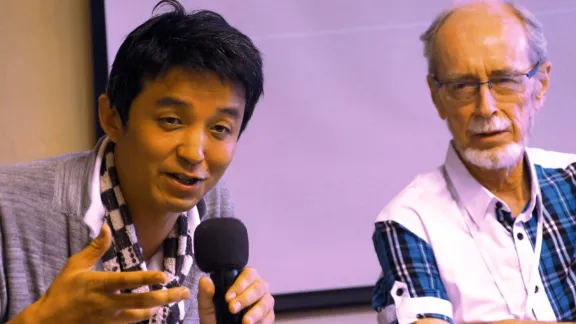
Japanese theologian Rev. Dr Arata Miyamoto speaks at the interfaith consultation where Pof. Notto R. Thelle from Norway (right) encouraged openness to the wisdom and experiences of other religions. Photo: LWF/I. Benesch
LWF co-sponsored consultation affirms continued dialogue at the grassroots of society
HONG KONG /GENEVA, 8 September 2015 (LWI) – An international consultation deliberating the role of religion in the public space in Asia has called for religious leaders to urgently articulate theology “not only with our heads but with our hearts and bodies fully engaged in the world.”
The Lutheran World Federation organized the 3-7 September gathering, Religious Life and Public Space in Asia, jointly with the Tao Fong Shan Christian Center and the Norwegian-based missionary organization, Areopagos. In a communiqué, the 30 theologians and scholars of religion who took part affirmed the significance of dialogue between people of different faiths as it occurs spontaneously at the grassroots of society and as it rallies community members around specific social issues.
This approach offered disadvantaged populations the possibility “to claim their voice and influence the discourse” while facilitating neighborly relations in “spite of very different religious beliefs,” they noted.
Rich spiritual resources
Speakers at the consultation included Prof. Anselm Min of Claremont Graduate University, California, United States, who reminded participants of the region’s rich spiritual resources and the potential of those resources to help people connect more deeply with their daily realities.
Min encouraged faith communities in Asia to mobilize their profound spirituality to help communities transcend notions of identity based on gender, ethnicity, religion, ideology and culture. He emphasized the need to intensify mutual dialogue in order to avoid misunderstandings and instead promote collaboration to reduce suffering.
Creation and salvation—two different concerns?
Prof. Notto Thelle, University of Oslo, Norway, invited participants to reconsider the distinction between creation and salvation from a Lutheran perspective by highlighting the Trinitarian structure of both.
“The problem arises when creation and salvation seem to be isolated as two separate aspects of God’s involvement in the world.” Overcoming this separation implies openness to the wisdom and experiences of other religions, added Thelle, who has been involved in several LWF dialogues over the past three decades.
Conflict as opportunity
Respect for co-existence was cited as a common value in Asia’s widely diverse cultural, religious and political landscape. However, youth participants from LWF member churches in Indonesia challenged this perception, arguing that sometimes conflict can offer opportunity to deepen relationships with others.
Prof. Saw Hlaing Bwa of the Myanmar Institute of Theology in Yangon added that “it is not enough to co-exist peacefully in the passive sense.” He stressed the need to move towards building healthy relationships in the public space that affirm the right to life for all with mutual understanding, mutual respect and mutual trust that can fully protect us from any divisive and life-destructive forces.”
Prof. Lai Pan-Chiu, the Chinese University of Hong Kong, related the Christian doctrine of salvation to Chinese cultures and religions. Lai Pan-Chiu suggested that “the doctrine of justification by faith implies an unconditional acceptance [of each other] which is based on one’s being rather than having” and therefore liberates people from affirming their value by consumption.
Public dimension of spiritual practice
Christians can bear public witness by engaging in joint initiatives with other religious communities. Prof. Kajsa Ahlstrand, Uppsala University, Sweden, described a joint Christian-Buddhist pilgrimage from Gothenburg to Karlskoga, Sweden, that illustrated the public dimension of a deeply spiritual practice.
Presenters from mainland China, Hong Kong, India, Indonesia, Japan, Malaysia, Myanmar and the Philippines reflected on various aspects of religious life, inter-religious dialogue, public theology and Christian engagement in the public sphere.
In her closing remarks, Rev. Dr Simone Sinn, LWF study secretary for Public Theology and Interreligious Relations, underlined the importance of joint responses to socio-political issues that especially affect vulnerable communities. Referring to earlier remarks by Bishop Ben Chang of the Evangelical Lutheran Church of Hong Kong, she reiterated the value of encounters that “challenge us to move beyond the Christian space within our four walls to an open space.”
Read the communiqué


